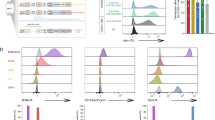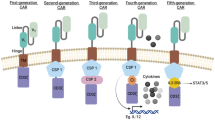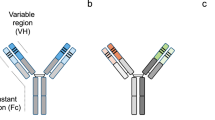Abstract
In recent years, cancer treatment involving adoptive cell therapy with chimeric antigen receptor (CAR)-modified patient’s immune cells has attracted growing interest. Using gene transfer techniques, the patient’s T cells are modified ex vivo with a CAR which redirects the T cells toward the cancer cells through an antibody-derived binding domain. The T cells are activated by the CAR primary signaling and costimulatory domains. Such “second generation” CAR T cells induced complete remission of B cell malignancies in the long-term. In this fast-moving field with a growing number of engineered T cell products, we list about 100 currently ongoing trials here that involve CAR T cells targeting hematopoietic malignancies and solid cancer. Major challenges in the further development of the therapy are briefly discussed.

Similar content being viewed by others
Abbreviations
- ALL:
-
Acute lymphocytic leukemia
- CEA:
-
Carcinoembryonic antigen
- CLL:
-
Chronic lymphocytic leukemia
- CRS:
-
Cytokine release syndrome
- NHL:
-
Non-Hodgkin’s lymphoma
- PSMA:
-
Prostate-specific membrane antigen
- tk:
-
Thymidine kinase
References
Eshhar Z (2008) The T-body approach: redirecting T cells with antibody specificity. Handb Exp Pharmacol 181:329–342. doi:10.1007/978-3-540-73259-4_14
Finney HM, Lawson AD, Bebbington CR, Weir AN (1998) Chimeric receptors providing both primary and costimulatory signaling in T cells from a single gene product. J Immunol 161:2791–2797
Hombach A, Wieczarkowiecz A, Marquardt T et al (2001) Tumor-specific T cell activation by recombinant immunoreceptors: CD3 zeta signaling and CD28 costimulation are simultaneously required for efficient IL-2 secretion and can be integrated into one combined CD28/CD3 zeta signaling receptor molecule. J Immunol 167:6123–6131
Chmielewski M, Kopecky C, Hombach AA, Abken H (2011) IL-12 release by engineered T cells expressing chimeric antigen receptors can effectively muster an antigen-independent macrophage response on tumor cells that have shut down tumor antigen expression. Cancer Res 71:5697–5706
Maude SL, Frey N, Shaw PA et al (2014) Chimeric antigen receptor T cells for sustained remissions in leukemia. N Engl J Med 371:1507–1517. doi:10.1056/NEJMoa1407222
Singh N, Frey NV, Grupp SA, Maude SL (2016) CAR T Cell Therapy in Acute Lymphoblastic Leukemia and Potential for Chronic Lymphocytic Leukemia. Curr Treat Options Oncol 17:28. doi:10.1007/s11864-016-0406-4
Savoldo B, Ramos CA, Liu E et al (2011) CD28 costimulation improves expansion and persistence of chimeric antigen receptor-modified T cells in lymphoma patients. J Clin Investig 121:1822–1826. doi:10.1172/JCI46110
Cruz CRY, Micklethwaite KP, Savoldo B et al (2013) Infusion of donor-derived CD19-redirected virus-specific T cells for B-cell malignancies relapsed after allogeneic stem cell transplant: a phase 1 study. Blood 122:2965–2973. doi:10.1182/blood-2013-06-506741
Xu X-J, Zhao H-Z, Tang Y-M (2013) Efficacy and safety of adoptive immunotherapy using anti-CD19 chimeric antigen receptor transduced T-cells: a systematic review of phase I clinical trials. Leuk Lymphoma 54:255–260. doi:10.3109/10428194.2012.715350
Zhang T, Cao L, Xie J et al (2015) Efficiency of CD19 chimeric antigen receptor-modified T cells for treatment of B cell malignancies in phase I clinical trials: a meta-analysis. Oncotarget 6:33961–33971. doi:10.18632/oncotarget.5582
Kalos M, Levine BL, Porter DL et al (2011) T cells with chimeric antigen receptors have potent antitumor effects and can establish memory in patients with advanced leukemia. Sci Transl Med 3:95ra73. doi:10.1126/scitranslmed.3002842
Porter DL, Levine BL, Kalos M et al (2011) Chimeric antigen receptor-modified T cells in chronic lymphoid leukemia. N Engl J Med 365:725–733. doi:10.1056/NEJMoa1103849
Porter DL, Hwang W-T, Frey NV et al (2015) Chimeric antigen receptor T cells persist and induce sustained remissions in relapsed refractory chronic lymphocytic leukemia. Sci Transl Med 7:303ra139. doi:10.1126/scitranslmed.aac5415
Brentjens RJ, Rivière I, Park JH et al (2011) Safety and persistence of adoptively transferred autologous CD19-targeted T cells in patients with relapsed or chemotherapy refractory B-cell leukemias. Blood 118:4817–4828. doi:10.1182/blood-2011-04-348540
Kochenderfer JN, Dudley ME, Feldman SA et al (2012) B-cell depletion and remissions of malignancy along with cytokine-associated toxicity in a clinical trial of anti-CD19 chimeric-antigen-receptor-transduced T cells. Blood 119:2709–2720. doi:10.1182/blood-2011-10-384388
Davila ML, Bouhassira DCG, Park JH et al (2014) Chimeric antigen receptors for the adoptive T cell therapy of hematologic malignancies. Int J Hematol 99:361–371. doi:10.1007/s12185-013-1479-5
Lee DW, Kochenderfer JN, Stetler-Stevenson M et al (2015) T cells expressing CD19 chimeric antigen receptors for acute lymphoblastic leukaemia in children and young adults: a phase 1 dose-escalation trial. Lancet 385:517–528. doi:10.1016/S0140-6736(14)61403-3
Morgan RA, Yang JC, Kitano M et al (2010) Case report of a serious adverse event following the administration of T cells transduced with a chimeric antigen receptor recognizing ERBB2. Mol Ther 18:843–851. doi:10.1038/mt.2010.24
Ahmed N, Brawley VS, Hegde M et al (2015) Human epidermal growth factor receptor 2 (HER2)-specific chimeric antigen receptor-modified T cells for the immunotherapy of HER2-positive sarcoma. J Clin Oncol 33:1688–1696. doi:10.1200/JCO.2014.58.0225
Gross G, Eshhar Z (2016) Therapeutic potential of T cell chimeric antigen receptors (CARs) in cancer treatment: counteracting off-tumor toxicities for safe CAR T cell therapy. Annu Rev Pharmacol Toxicol 56:59–83. doi:10.1146/annurev-pharmtox-010814-124844
Fedorov VD, Themeli M, Sadelain M (2013) PD-1- and CTLA-4-based inhibitory chimeric antigen receptors (iCARs) divert off-target immunotherapy responses. Sci Transl Med 5:215ra172. doi:10.1126/scitranslmed.3006597
Kloss CC, Condomines M, Cartellieri M et al (2012) Combinatorial antigen recognition with balanced signaling promotes selective tumor eradication by engineered T cells. Nat Biotechnol 31:71–75. doi:10.1038/nbt.2459
Beatty GL, Haas AR, Maus MV et al (2014) Mesothelin-specific chimeric antigen receptor mRNA-engineered T cells induce anti-tumor activity in solid malignancies. Cancer Immunol Res 2:112–120. doi:10.1158/2326-6066.CIR-13-0170
Brentjens R, Yeh R, Bernal Y et al (2010) Treatment of chronic lymphocytic leukemia with genetically targeted autologous T cells: case report of an unforeseen adverse event in a phase I clinical trial. Mol Ther 18:666–668. doi:10.1038/mt.2010.31
Grupp SA, Kalos M, Barrett D et al (2013) Chimeric antigen receptor-modified T cells for acute lymphoid leukemia. N Engl J Med 368:1509–1518. doi:10.1056/NEJMoa1215134
Chen F, Teachey DT, Pequignot E et al (2016) Measuring IL-6 and sIL-6R in serum from patients treated with tocilizumab and/or siltuximab following CAR T cell therapy. J Immunol Methods 434:1–8. doi:10.1016/j.jim.2016.03.005
Davila ML, Riviere I, Wang X et al (2014) Efficacy and toxicity management of 19-28z CAR T cell therapy in B cell acute lymphoblastic leukemia. Sci Transl Med 6:224ra25. doi:10.1126/scitranslmed.3008226
Maude SL, Barrett D, Teachey DT, Grupp SA (2014) Managing cytokine release syndrome associated with novel T cell-engaging therapies. Cancer J 20:119–122. doi:10.1097/PPO.0000000000000035
Teachey DT, Lacey SF, Shaw PA et al (2016) Identification of predictive biomarkers for cytokine release syndrome after chimeric antigen receptor T-cell therapy for acute lymphoblastic leukemia. Cancer Discov 6:664–679. doi:10.1158/2159-8290.CD-16-0040
Katz SC, Burga RA, McCormack E et al (2015) Phase I hepatic immunotherapy for metastases study of intra-arterial chimeric antigen receptor-modified t-cell therapy for CEA + Liver Metastases. Clin Cancer Res 21:3149–3159. doi:10.1158/1078-0432.CCR-14-1421
Xu Y, Zhang M, Ramos CA et al (2014) Closely related T-memory stem cells correlate with in vivo expansion of CAR.CD19-T cells and are preserved by IL-7 and IL-15. Blood 123:3750–3759. doi:10.1182/blood-2014-01-552174
Abken H (2015) Adoptive therapy with CAR redirected T cells: the challenges in targeting solid tumors. Immunotherapy 7:535–544. doi:10.2217/imt.15.15
Kobold S, Grassmann S, Chaloupka M et al (2015) Impact of a new fusion receptor on PD-1-mediated immunosuppression in adoptive T cell therapy. J Natl Cancer Inst. doi:10.1093/jnci/djv146
Kawalekar OU, O’Connor RS, Fraietta JA et al (2016) Distinct signaling of coreceptors regulates specific metabolism pathways and impacts memory development in CAR T cells. Immunity 44:380–390. doi:10.1016/j.immuni.2016.01.021
Kochenderfer JN, Wilson WH, Janik JE et al (2010) Eradication of B-lineage cells and regression of lymphoma in a patient treated with autologous T cells genetically engineered to recognize CD19. Blood 116:4099–4102. doi:10.1182/blood-2010-04-281931
Kochenderfer JN, Dudley ME, Kassim SH et al (2015) Chemotherapy-refractory diffuse large B-cell lymphoma and indolent B-cell malignancies can be effectively treated with autologous T cells expressing an anti-CD19 chimeric antigen receptor. J Clin Oncol 33:540–549. doi:10.1200/JCO.2014.56.2025
Kochenderfer JN, Dudley ME, Carpenter RO et al (2013) Donor-derived CD19-targeted T cells cause regression of malignancy persisting after allogeneic hematopoietic stem cell transplantation. Blood 122:4129–4139. doi:10.1182/blood-2013-08-519413
Brentjens RJ, Davila ML, Riviere I et al (2013) CD19-targeted t cells rapidly induce molecular remissions in adults with chemotherapy-refractory acute lymphoblastic leukemia. Sci Transl Med 5:177ra38. doi:10.1126/scitranslmed.3005930
Garfall AL, Maus MV, Hwang W-T et al (2015) Chimeric antigen receptor T cells against CD19 for multiple myeloma. N Engl J Med 373:1040–1047. doi:10.1056/NEJMoa1504542
Till BG, Jensen MC, Wang J et al (2012) CD20-specific adoptive immunotherapy for lymphoma using a chimeric antigen receptor with both CD28 and 4-1BB domains: pilot clinical trial results. Blood 119:3940–3950. doi:10.1182/blood-2011-10-387969
Wang Q, Wang Y, Lv H et al (2015) Treatment of CD33-directed chimeric antigen receptor-modified T cells in one patient with relapsed and refractory acute myeloid leukemia. Mol Ther 23:184–191. doi:10.1038/mt.2014.164
Ritchie DS, Neeson PJ, Khot A et al (2013) Persistence and efficacy of second generation CAR T cell against the LeY antigen in acute myeloid leukemia. Mol Ther 21:2122–2129. doi:10.1038/mt.2013.154
van Schalkwyk MCI, Papa SE, Jeannon J-P et al (2013) Design of a phase I clinical trial to evaluate intratumoral delivery of ErbB-targeted chimeric antigen receptor T-cells in locally advanced or recurrent head and neck cancer. Hum Gene Ther Clin Dev 24:134–142. doi:10.1089/humc.2013.144
Morgan RA, Johnson LA, Davis JL et al (2012) Recognition of glioma stem cells by genetically modified T cells targeting EGFRvIII and development of adoptive cell therapy for glioma. Hum Gene Ther 23:1043–1053. doi:10.1089/hum.2012.041
Maus MV, Haas AR, Beatty GL et al (2013) T cells expressing chimeric antigen receptors can cause anaphylaxis in humans. Cancer Immunol Res 1:26–31. doi:10.1158/2326-6066.CIR-13-0006
You F, Jiang L, Zhang B et al (2016) Phase 1 clinical trial demonstrated that MUC1 positive metastatic seminal vesicle cancer can be effectively eradicated by modified Anti-MUC1 chimeric antigen receptor transduced T cells. Sci China Life Sci. 59:386–397. doi:10.1007/s11427-016-5024-7
Acknowledgments
Work in the authors’ laboratory was supported by the Deutsche Forschungsgemeinschaft, Bonn, Germany, the Deutsche Krebshilfe, Bonn, Germany, the Deutsche José Carreras-Leukämie Stiftung, Munich, Germany, the Else Kröner-Fresenius Stiftung, Bad Homburg v.d.H., Germany, and the Fortune Program of the Medical Faculty of the University of Cologne, Cologne, Germany.
Author information
Authors and Affiliations
Corresponding author
Ethics declarations
Conflict of interest
Hinrich Abken serves on the scientific advisory board of Miltenyi Biotec. The other authors declare no conflict of interest.
Rights and permissions
About this article
Cite this article
Holzinger, A., Barden, M. & Abken, H. The growing world of CAR T cell trials: a systematic review. Cancer Immunol Immunother 65, 1433–1450 (2016). https://doi.org/10.1007/s00262-016-1895-5
Received:
Accepted:
Published:
Issue Date:
DOI: https://doi.org/10.1007/s00262-016-1895-5




